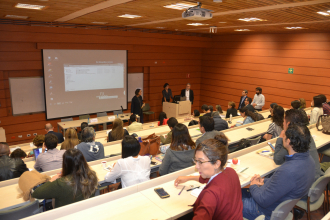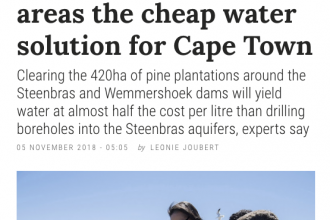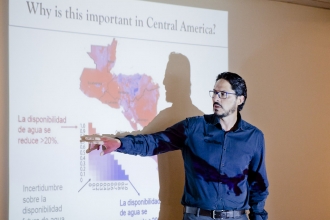
International Researcher Esteve Corbera from ICTA- Universitat Autònoma de Barcelona visits EfD Colombia and participates in the policy day and the environmental economics seminar series
During November 12 th to 16 th Professor Esteve Corbera came as a visiting researcher to Universidad de Los Andes, which is the host institution of EfD Colombia. International Researcher Esteve…

EPRU researcher helps inform long-term water planning in Cape Town
The South African city of Cape Town is recovering from the worst drought in over a century. Policy makers are scrabbling to find ways to boost the city's water supply, to avoid facing the kind of…

Drought-stricken Cape Town's water management given boost by EPRU researcher
The South African city of Cape Town is recovering from the worst drought in over a century. Policy makers are scrabbling to find ways to boost the city's water supply, to avoid facing the kind of…
Direct and Spillover Effects of a Social Information Campaign on Residential Water-Savings
This paper investigates direct and spillover effects of a social information campaign aimed at encouraging residential water savings in Colombia. The campaign was organized as a randomized field experiment, consisting of monthly delivery of consumption reports, including normative messages, for one year. Results indicate that social information and appeals to norm-based behavior reduce water use by up to 6.8% in households directly targeted by the campaign.

Water at core of EfD Central America's research and policy efforts
Water is fundamental for sustainable development, healthy ecosystems and energy and food production. This issues have been a priority for EfD Central America’s research agenda for more than 10 years…
Lessons from Applying Market-Based Incentives in Watershed Management
Watershed management is a complex activity with constraints on funding and human
resources in many parts of the world, and there is a need for global effort to identify
strategies that can work. To complement regulatory approaches, attention is now also being
given to market-based incentives because of their potential cost-effectiveness. This study
seeks to provide impetus to the use of the most successful market-based incentives to
promote sustainable watershed practices through strengthening and increasing direct participation
Resource Scarcity and Cooperation: Evidence from an Irrigation System in Western China
This study examines the impact of long-term exposure to resource scarcity on farmers’ cooperation. A
Functional forms and price elasticities in a discrete continuous choice model of the residential water demand
During recent decades, water demand estimation has gained considerable attention from scholars. From an econometric perspective, the most used functional forms include log-log and linear specifications. Despite the advances in this field and the relevance for policymaking, little attention has been paid to the functional forms used in these estimations, and most authors have not provided justifications for their selection of functional forms. A discrete continuous choice model of the residential water demand is estimated using six functional forms (log-log, full-log, log q
Distributional impacts of climate change on basin communities: an integrated modeling approach.
Agriculture is one of the most vulnerable economic sectors to the impacts of climate change, specifically those related with expected changes in water availability. By using a hydro-economic model, this study assesses the distributional impacts of climate change, considering the geographical location of each farmer’s community and the spatial allocation of water resources at basin scale. A hydrological model, the Soil and Water Assessment Tool model, describes the basin hydrology, while farmers’ economic responses are represented using a non-linear agricultural supply model.&nbs
Pagination
- Previous page
- Page 29
- Next page

